
January 29

1856 Victoria Cross: Queen Victoria of the United Kingdom issues a Warrant under the Royal sign-manual that established the Victoria Cross, originally to recognise acts of valour by British military personnel during the Crimean War.
[Note: The VC takes precedence over all other British and Commonwealth medals and orders.]
1891 Liliuokalani proclaimed queen of Hawaii: Following the death of her brother, King Kalakaua, Liliuokalani becomes the last monarch of the Hawaiian Islands. [For further information, click here]
1915 World War I: German lieutenant Erwin Rommel leads daring mission in France:
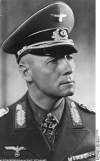
On January 29, 1915, in the Argonne region of France, German lieutenant Erwin Rommel leads his company in the daring capture of four French block-houses, the structures used on the front to house artillery positions.
Rommel crept through the French wire first and then called for the rest of his company to follow him. When they hung back after he had repeatedly shouted his orders, Rommel crawled back, threatening to shoot the commander of his lead platoon if the other men did not follow him. The company finally advanced, capturing the block-houses and successfully combating an initial French counter-attack before they were surrounded, subjected to heavy fire and forced to withdraw.
Rommel was awarded the Iron Cross, First Class, for his bravery in the Argonne; he was the first officer of his regiment to be so honored. Where Rommel is, there is the front, became a popular slogan within his regiment. The bravery and ingenuity he displayed throughout the Great War, even in light of the eventual German defeat, led to Rommel's promotion through the ranks of the army in the post-war years.
In May 1940, Erwin Rommel was at the head of the 7th Panzer Division that invaded France with devastating success at the beginning of the Second World War. Promoted to general and later to field marshal, he was sent to North Africa at the head of the German forces sent to aid Hitler's ally, Benito Mussolini. Known as the Desert Fox, Rommel engineered impressive victories against Britain in Libya and Egypt before his troops were decisively defeated at El Alamein in Egypt in 1943 and forced to retreat from the region.
Back in France to see the success of the Allied invasion in June and July 1944, Rommel warned Hitler that the end of the war was near. The unequal struggle is nearing its end, Rommel sent in a teletype message on July 15. I must ask you immediately to draw the necessary conclusions from this situation.
Suspected by Hitler of conspiring against him in the so-called July Plot, Rommel was presented with an ultimatum: suicide, with a state funeral and protection for his family, or trial for high treason. Rommel chose the former, taking poison pills on October 14, 1944. He was buried with full military honors. (History.com)
1916 World War I: Various:
The first bombings of Paris by Zeppelins:
At the outbreak of the war the German army had six operational dirigibles, and the navy had one. The army was quick to experiment with them—bombing Liege and Antwerp—despite the fact that at this stage no specially designed aerial bombs existed. But the army's initial experience was not encouraging - they lost three airships in the first months of the war to anti aircraft fire. Despite this the navy was very enthusiastic. They saw the Zeppelin as a solution to their reconnaissance problems. If the army traditionally used the cavalry for reconnaissance, the navy traditionally used the light cruiser. Germany had very few such ships, and an airship was viewed as being cheaper.
New battlefield weapons system is tested by the British for the first time: The Tank:
Development of the tank began in the summer of 1915. The idea was to combine the caterpillar tracks of an American tractor with an iron-clad machine that could straddle the enemy's trenches. By spring of the following year a working model was available for testing. Manned by a crew of four, the 30-ton weapon's armament consisted of two cannon mounted on its sides. It lumbered along at three miles an hour. Encased in an unlit steel box, the crew suffered in an atmosphere that was only one step removed from hell.
1919 Recognition of the Paderewski Government by USA:
US Secretary of State Robert Lansing: The President of the United States directs me to extend to you, as Foreign Minister and Secretary of Foreign Affairs of the Provisional Polish Government, its sincere wishes for your success in the high office which you have assumed and his earnest hope that the Government of which you are a part will bring prosperity to the Republic of Poland. It is my privilege to extend to you at this time my personal greetings and officially to assure you that it will be a source of gratification to enter into official relations with you at the earliest opportunity. To render to your country such aid as is possible at this time, as it enters upon a new cycle of independent life, will be in due accord with that spirit of friendliness which has in the past animated the American people in their relations with your countrymen.
1920 Volkishness: Philipp Stauff continues operation of the List Society at its new headquarters in Berlin. From his home at Moltkestrasse 46a in Berlin-Lichterfelde, Stauff publishes new editions of Guido von List's Ario-Germanic researches until 1922. (THP)
1932 Shanghai Provocation: Japanese forces continue their attack on Shanghai. [See: Countdown to Infamy: Timeline to Pearl Harbor.]
1934: Various:
Volkishness: Thule Society The SA issues a warning card on Baron Rudolf von Sebottendorf:
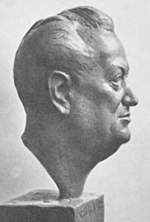
Undoubtedly, Sebottendorf exaggerated his own significance. There is no evidence that he and Hitler ever met. Nevertheless, the German Worker's Party, which Hitler joined and later renamed, was founded by Anton Drexler early in 1919 under the chairmanship of Karl Harrer, a member of the Thule. In fact, the German Workers' Party had a number of close links with the Thule society. Hitler also had intimate ties with Thule members. Dietrich Eckart, whom Hitler accepted as his mentor and praised as the original father of the Nazi movement, Alfred Rosenberg, eventually the Nazi party's ideologist, and Rudolf Hess, Hitler's future second-in-command, were all members of the Thule Society. Sebottendorf's Thule Society, with its occult, racist ideas is, regardless of any exaggeration in Sebottendorf's claims, connected to the beginning of Hitler's National Socialism.
The Pro-Communist New Masses (January 29 and February 5, 1934) publishes an article entitled "Wall Street's Fascist Conspiracy" by John L. Spivak. This article claims that the Warburg family is involved in a fascist conspiracy with the J.P. Morgan international banking interests, has opposed the anti-Nazi boycott and controls the American Jewish Committee, while at the same time their Kuhn Loeb and Co. in New York is underwriting Nazi shipping and industrialization. No mention is made of the Warburg family's close connection with Averell Harriman, already a permanent hero of the Soviet Union. (THP)
1936 Church and Reich: An article in the Catholic Klerusblatt justifies the Nuremberg Laws as indispensable safeguards for the qualitative makeup of the German people. The German government begins a series of trials of members of the religious orders accused of violating the foreign currency laws. Press coverage is hostile to the accused in almost all cases. [See: Was Adolf Hitler a Christian"]
1940 Church and Reich: Ambassador Bergen reports to Berlin that the Papal Secretary of State has ordered the immediate cessation of all broadcasts about atrocities in Poland. (THP)
1941 Death: Franz Guertner: Bavarian Minister of Justice from 1922 to 1932. After the Munich putsch, Guertner actively advocated a pro-Nazi atmosphere during Hitler's trial in People's Court (1924) and was largely responsible for Hitler receiving such a lenient sentence. It was also Guertner who arranged for Hitler's early release from prison and later persuaded the Bavarian government to lift the ban on the NSDAP, allowing Hitler to once again speak in public. Guertner served as Reich Minister of Justice from 1932 until his death this day.
1942 World War II: Various:
Iran signs Treaty of Alliance with Great Britain and USSR:
On this day, Britain and the USSR secure an agreement with Iran that offers the Iran protection while creating a "Persian corridor" for the Allies—a supply route from the West to Russia.
Early in the war, Iran collaborated with Germany by exporting grain to the Axis power in exchange for technicians. But the Allies viewed Iran as a valuable source of oil and conveniently situated as a route for shipping Western war material east to the USSR. On August 25, 1941, both Allied powers invaded Iran (which Prime Minister Winston Churchill preferred to call "Persia," so there would be no confusion between "Iran" and "Iraq"), the Soviets from the north and the Brits from the south. In four days, the Allies effectively controlled Iran.
On September 16, the ruling shah abdicated, and his 23-year-old son, Muhammad, assumed power and pushed through the Iranian parliament the Treaty of Alliance, which allowed the Allies freedom to move supplies through the country and gave them whatever else they needed from Iran to win the war. The new shah also vowed "not to adopt in his relations with foreign countries an attitude which is inconsistent with the alliance."
In exchange, Iran was promised wartime protection from Axis invasion—and a guarantee that the Allies would leave Iranian soil within six months of the close of the war.
The alliance started off shakily: the Soviets bought up most of Iran's grain harvest, which caused a bread shortage and riots in the streets. Allied troops put the rebellion down, and the United States shipped in grain to compensate for the losses. The Soviet Union then attempted to agitate for the overthrow of the shah by supporting the Tudeh (Farsi for "masses") party, which the Soviets believed would be more generous in oil concessions. Tudeh forces did manage temporarily to take over northern Iran in December 1944.
When the war ended, the Allies began leaving Iran as promised—except for the USSR. Complaints were made to the United Nations, and pressure was applied by the United States and Great Britain, as this was a violation of one of the terms of the Treaty of Alliance. The Soviets finally began pulling out of Iran in April 1946, but as they withdrew, they continued to foster more bloody rebellions between the shah's government and the Tudeh; the Tudeh were decisively defeated in December 1946 when the shah declared martial law. (History.com)
From a circular of the Arbeitseinsatz: [Note: Arbeitseinsatz (labor deployment) was forced labor (Zwangsarbeit) during World War II when German men were called up for military service and German authorities rounded up laborers, some from Germany but more from the occupied territories, to fill in the vacancies.]:
Berlin (SW 11), 29 January 1942, Saarlandstrasse 96. Subject: Increased mobilization of labor for the German Reich from the occupied territories and preparations for mobilization by force. The labor shortage, aggravated on the one hand by drafts for the Wehrmacht and on the other hand by the increased amount of work for armaments in the Reich, renders it necessary for labor for service in the Reich to be recruited from the occupied territories to a much greater extent than heretofore, in order to relieve the shortage. Therefore, any and all methods must be adopted which make it possible to transport, without exception and at once, for employment in the Reich, manpower in the occupied territories which is unemployed or which can be released . . . for use in Germany after most careful screening . . . . In the first place, this mobilization shall be carried out on a voluntary basis as hitherto. For this reason recruitment for employment in the German Reich must be intensified considerably. If, however, satisfactory results are to be obtained, the German authorities who are operating in the occupied territories must be able to exert any pressure necessary to support the voluntary recruitment of labor for employment in Germany. Accordingly, as far as may be necessary, the regulations in force in the occupied territories with regard to changing the place of employment or . . . those refusing work, must be tightened. Supplementary regulations concerning distribution of labor must, above all, insure that older persons who are exempt will be used to replace younger persons so that the latter may be made available for the Reich. A far-reaching reduction in the amount of relief granted by public welfare must also be effected in order to induce laborers to accept employment in the Reich. Unemployment relief must be set so low that the amount, in comparison with the average wages in the Reich and the possibilities there for sending remittances home, may serve as an inducement to the workers to accept employment in Germany. When refusal to accept work in the Reich is not justified, relief must be reduced to an amount barely sufficient for subsistence or even cancelled. In this case partial withdrawal of ration cards and an assignment to particularly heavy compulsory work may be considered.
From a circular issued by Dr. Mansfeld on the responsibility of Hermann Goering:
In order to avoid effects detrimental to the armament industry, all considerations must yield to the necessity of filling in every case the gaps in the labor supply caused by extensive drafting into the Wehrmacht. To this end the forced mobilization of workers from the occupied territories must not be overlooked if voluntary recruitment should not succeed. The mere possibility of compulsory mobilization will, in many cases, facilitate recruiting. Therefore I ask you to take immediate steps in your district to promote the employment of workers in the German Reich on a voluntary basis. I herewith request you to prepare for publication, regulations to render possible forced mobilization of labor in your territory for Germany, so that they may be decreed at once in case recruiting on a voluntary basis remains without the success necessary to relieve labor in the Reich.
1943 World War II: Various:
Stalingrad: (Night of 29/30) Milch succeeds in flying in 124 aircraft to drop supplies into the pocket. This constitutes the highest number of sorties flown for some time, but is too late to affect the inevitable course of events. (THP)
From a speech by Arthur Seyss-Inquart:

It is also clear, now more than ever, that every resistance which is directed against this fight for existence must be suppressed. Some time ago the representatives of the churches had written to the Wehrmacht commander and to me, and they presented their ideas in regard to the execution of death sentences which the Wehrmacht commander announced in the meantime. To this I can say only the following: At the moment in which our men, fathers, and sons with iron determination look towards their fate in the East and unflinchingly and steadfastly perform their highest pledge, it is unbearable to tolerate conspiracies whose goal is to weaken the rear of this eastern front. Whoever dares this must be annihilated. We must be severe and become even more severe against our opponents. This is the command of a relentless sequence of events and for us, perhaps, inhumanly hard but our holy duty. We remain human because we do not torture our opponents. We must remain hard in annihilating them.
War in the Pacific: The Battle of Rennell Island, the last major naval engagement between the United States Navy and the Imperial Japanese Navy during the Guadalcanal Campaign, began. [For further information, click here]
1944 World War II: Various:
Church and Reich: Cardinal Bertram writes to the Government that he has received reports that the ordinances enacted for the Jews are now to be applied to the Mischlinge (half-Jews and quarter-Jews). These Christians, he writes, have already been declared unworthy of military service, could not attend institutions of higher learning, etc. Now one hears that they are to be conscripted into special formations for labor service. All these measures . . . aim clearly at segregation which in the end threatens extermination. The Mishlinge were German and Christians . . . and always rejected by the Jews. The German Catholics indeed numerous Christians in Germany . . . would be deeply hurt if these fellow Christians now would have to meet a fate similar to that of the Jews. (THP)
Stalin to FDR and Churchill:
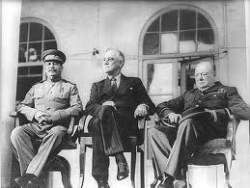
I must say that after getting your joint favorable reply to my question in Tehran about transferring Italian ships to the Soviet Union before the end of January 1944, I had considered the matter settled; it never occurred to me that that decision reached and agreed to by the three of us could be revised in any way, All the more so because we agreed at the time that the matter would be fully settled with the Italians during December and January. Now I see that this is not the case and that nothing has been said to the Italians on this score. However, in order not to delay settlement of this matter, which is so vitally important to our common fight against Germany, the Soviet Union is willing to accept your proposal.
Massacre: Lithuanian/Jewish partisans murder 300 villagers, mostly women and children, in Koniuchy, for resisting their raids.
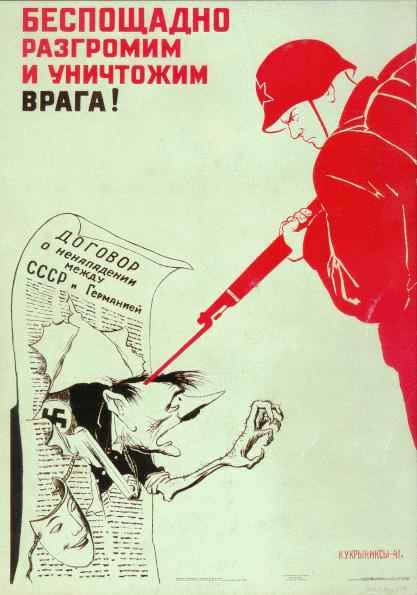
1945 Eastern Front: Zhukov, more or less ignoring Himmler's army group, reaches the Oder. Himmler soon orders a counter-attack that immediately fails miserably. Bischofsburg falls to the Soviets.

1946 Nuremberg Tribunal: Day 45.
Continuation of Testimony of Francois Boix.
Cross examination of Francois Boix.
Evidence in chief and cross examination of Hans Cappelen.
Evidence in chief and cross examination of Paul Roser.
Evidence in chief and cross examination of Alfred Balachowsky.
The arrival of the first prisoners of war took place in 1941. The arrival of 2,000 Russian prisoners of war was announced. With regard to Russian prisoners of war, they took the same precautions as in the case of the Republican Spanish prisoners of war. They put machine guns everywhere around the barracks and expected the worst. As soon as the Russian prisoners of war entered the camp one, could see that they were in a very bad state, they could not even understand anything. They were human scarecrows. They were then put in barracks, 1,600 to a barracks. You must bear in mind these barracks were 7 meters wide by 50 long. They were divested of their clothes, of the very little they had with them; they could keep only one pair of drawers and one shirt. One has to remember that this was in November and in Mauthausen it was more than 10 degrees (centigrade) below zero.
Upon their arrival there were already 20 deaths, from walking only the distance of 4 kilometers between the station and camp of Mauthausen. At first the same system was applied to them as to us Republican Spanish prisoners. They left us with nothing to do, with no work.
They were left to themselves, but with scarcely anything to eat. At the end of a few weeks they were already at the end of their endurance. Then began the process of elimination. They were made to work under the most horrible conditions, they were beaten, hit, kicked, insulted; and out of the 7,000 Russian prisoners of war who came from almost everywhere, only 30 survivors were left at the end of three months. [For the full text of today's proceedings, Click here.]
1964 Cold War: Dr. Strangelove premieres:
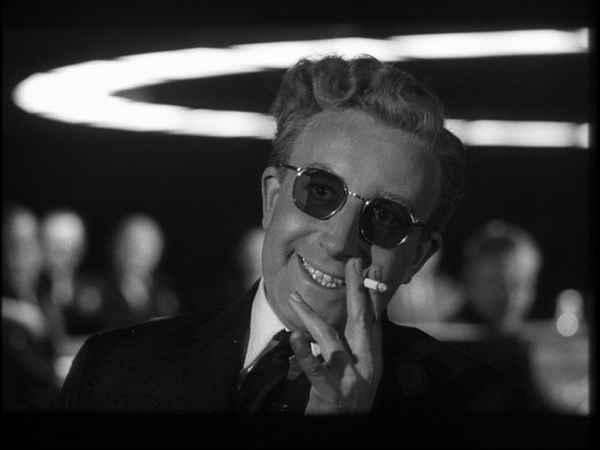
Stanley Kubrick's black comic masterpiece, Dr. Strangelove or: How I Learned to Stop Worrying and Love the Bomb opens in theaters to both critical and popular acclaim. The movie's popularity was evidence of changing attitudes toward atomic weapons and the concept of nuclear deterrence.
The movie focused on the actions of a rogue U.S. officer who believes that communists are threatening the "precious bodily fluids" of Americans. Without authorization, he issues orders to U.S. bombers to launch atomic attacks against the Soviet Union. When it becomes evident that some of the bombers may actually drop their atomic payloads, American President Merkin Muffley frantically calls his Soviet counterpart. The Russian leader informs Muffley that an atomic attack on the Soviet Union will automatically unleash the terrible "doomsday machine," which will snuff out all life on the planet. Muffley's chief foreign policy advisor, Dr. Strangelove, reassures the president and chief officials that all is not lost: they can, he posits, survive even the doomsday machine by retreating to deep mineshafts.
Close scrutiny of the Dr. Strangelove character indicated that he was probably a composite of three people: Henry Kissinger, a political scientist who had written about nuclear deterrence strategy; Edward Teller, a key scientist in the development of the hydrogen bomb; and Wernher von Braun, the German scientist who was a leading figure in missile technology.
Little scrutiny was needed, however, to grasp Kubrick's satirical attacks on the American and Russian policies of nuclear stockpiling and massive retaliation. The film's jabs at some of the sacred core beliefs of America's defense strategy struck a chord with the American people. Particularly after the frightening Cuban Missile Crisis of 1962--when nuclear annihilation seemed a very real possibility--the American public was increasingly willing to question the nation's reliance on nuclear weapons. (History.com)
[See also: Wunderwaffen: Hitler's Deception and the History of Rocketry.]
1979 Cold War: Deng Xiaoping and Jimmy Carter sign accords: On January 29, 1979, Deng Xiaoping, deputy premier of China, meets President Jimmy Carter, and together they sign historic new accords that reverse decades of U.S. opposition to the People's Republic of China. [For further information, click here]
2002 George W. Bush makes "Axis of Evil" speech: On this day in 2002, not long after the shocking attacks of September 11, 2001, President George W. Bush delivers a State of Union address in which he denounces countries suspected of harboring terrorists and developing weapons of mass destruction. [For further information, click here]
Edited by Levi Bookin (Copy editor)
levi.bookin@gmail.com



Click to join 3rdReichStudies



Disclaimer: This site includes diverse and controversial materials--such as excerpts from the writings of racists and anti-Semites--so that its readers can learn the nature and extent of hate and anti-Semitic discourse. It is our sincere belief that only the informed citizen can prevail over the ignorance of Racialist "thought." Far from approving these writings, this site condemns racism in all of its forms and manifestations.
Fair Use Notice: This site may contain copyrighted material the use of which has not always been specifically authorized by the copyright owner. We are making such material available in our efforts to advance understanding of historical, political, human rights, economic, democracy, scientific, environmental, and social justice issues, etc. We believe this constitutes a "fair use" of any such copyrighted material as provided for in section 107 of the US Copyright Law. In accordance with Title 17 U.S.C. Section 107, the material on this site is distributed without profit to those who have expressed a prior interest in receiving the included information for research and educational purposes. If you wish to use copyrighted material from this site for purposes of your own that go beyond 'fair use', you must obtain permission from the copyright owner.
Please Note: The list-owner and the moderator of 3rdReichStudies are not responsible for, and do not necessarily approve of, the random ads placed on our pages by our web server. They are the unfortunate price one pays for a 'free' website.